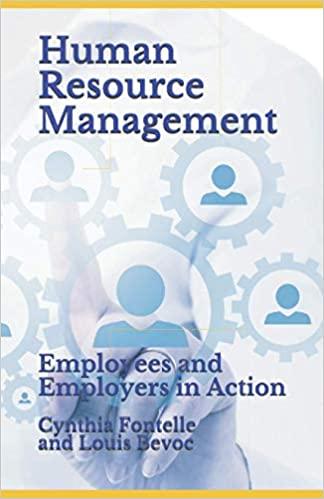Answered step by step
Verified Expert Solution
Question
1 Approved Answer
analyse the leadership, organizational structure,organizational culture, and organizational change in this case.Case 9 THE SHIPPING INDUSTRY ACCOUNTING TEAM by Steven L . McShane, University of
analyse the leadership, organizational structure,organizational culture, and organizational change in this case.Case THE SHIPPING INDUSTRY ACCOUNTING TEAM
by Steven L McShane, University of Newcastle Australia
For the past five years, I have been working at McKay,
Sanderson, and Smith Associates, a midsized accounting
firm in Halifax that specializes in commercial accounting
and audits. My particular speciality is accounting practices
for shipping companies, ranging from small fishing fleets
to a couple of the big firms with ships on the St Lawrence
Seaway.
About months ago, McKay, Sanderson, and Smith
Associates became part of a large merger involving two other
accounting firms across Canada. These firms have offices
in Montreal, Ottawa, Toronto, Calgary, and Vancouver.
Although the other two accounting firms were much larger
than McKay, all three firms agreed to avoid centralizing
the business around one office in Toronto. Instead, the new
firmcalled Goldberg, Choo, and McKay Associates
would rely on teams across the country to "leverage the syn
ergies of our collective knowledge" an oftencited statement
from the managing partner soon after the merger
The merger began to affect me a year ago when my boss
a senior partner and vicepresident of the merger firm
announced that I would be working more closely with three
people from the other two firms to become the firm's new
shipping industry accounting team. The other "team mem
bers" were Rochelle in Montreal, Thomas in Toronto, and
Brad in Vancouver. I had met Rochelle briefly at a meeting
in Montreal during the merger. I have never met Thomas or
Brad, but was informed during the integration meetings that
they were shipping accounting professionals at the other firms.
Initially, the shipping "team" activities involved email
ing each other about new contracts and prospective clients.
Later, we were asked to submit joint monthly reports on
accounting statements and issues. Normally, I submitted my
own monthly reports that summarize activities involving
my own clients. Coordinating the monthly report with three
other people took much more time, particularly since differ
ent accounting documentation procedures across the three
firms were still being resolved. It took numerous emails
and a few telephone calls to work out a reasonable monthly
report style.
During this aggravating process, it became apparentto
me at leastthat this "teams" business was costing me more
time than it was worth. Moreover, Brad in Vancouver didn't
have a clue as to how to communicate with the rest of us
He rarely replied to emails. Instead, he often used the tele
phone voicemail system, which resulted in lots of telephone
tag. Brad arrives at work at am in Vancouver and is often
late! which is early afternoon in Halifax. I typically have a
flexible work schedule from : am to : so I can
chauffeur my kids after school to sports and music lessons.
So Brad and I have a window of less than three hours to share
information.
The biggest nuisance with the shipping specialist account
ing team started two weeks ago when the firm asked the
four of us to develop a new strategy for attracting new ship
pingfirm clients. This new strategic plan is a messy busi
ness. Somehow, we have to share our thoughts on various
approaches, agree on a new plan, and write a unified submis
sion to the managing partner. Already, the project is taking
most of my time just writing and responding to emails, and
participating in conference calls which none of us did much
before the team formed
Thomas and Rochelle have already had two or three "mis
understandings" via email about their different perspectives
on delicate matters in the strategic plan. The worst of these
disagreements required a conference call with all of us to
resolve. Except for the most basic matters, it seems that we
can't understand each other, let alone agree on key issues. I
have come to the conclusion that I would never want Brad to
work in my Halifax office thank goodness, he's on the other
side of the country While Rochelle and I seem to agree on
most points, the overall team can't form a common vision or
strategy. I don't know how Rochelle, Thomas, or Brad feel,
but I would be quite happy to work somewhere that did not
require any of these longdistance team headaches.

Step by Step Solution
There are 3 Steps involved in it
Step: 1

Get Instant Access to Expert-Tailored Solutions
See step-by-step solutions with expert insights and AI powered tools for academic success
Step: 2

Step: 3

Ace Your Homework with AI
Get the answers you need in no time with our AI-driven, step-by-step assistance
Get Started


